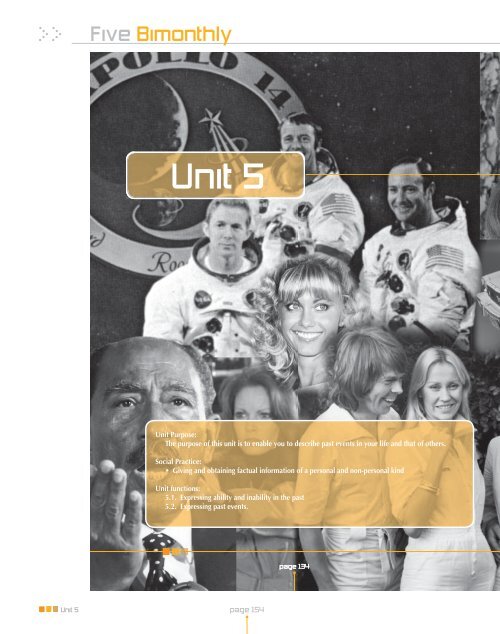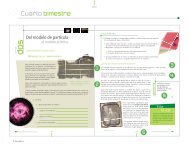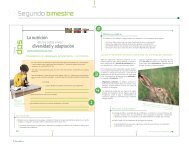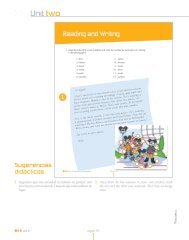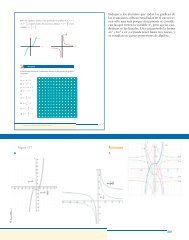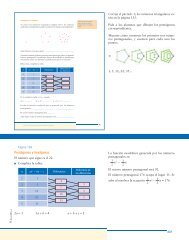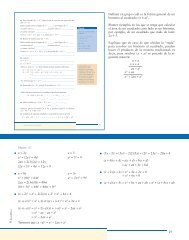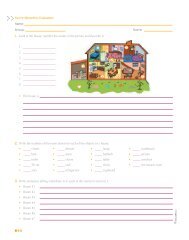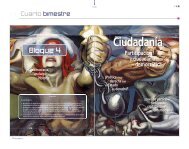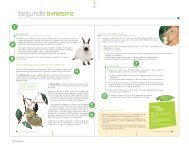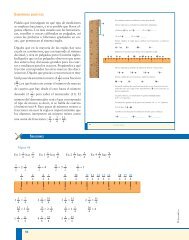Past Tim
Past Tim
Past Tim
Create successful ePaper yourself
Turn your PDF publications into a flip-book with our unique Google optimized e-Paper software.
Five Bimonthly<br />
Unit 5<br />
Unit Purpose:<br />
The purpose of this unit is to enable you to describe past events in your life and that of others.<br />
Social Practice:<br />
• Giving and obtaining factual information of a personal and non-personal kind<br />
Unit functions:<br />
5.1. Expressing ability and inability in the past<br />
5.2. Expressing past events.<br />
page 134<br />
Unit 5<br />
page 154<br />
INGLES P 9okNEW.indd 134 8/8/08 11:49:39
<strong>Past</strong> <strong>Tim</strong>es<br />
Performance evidence<br />
• You will be able to recognize and understand quotidian texts in order to use them<br />
purposefully.<br />
• You will be able to recognize and understand academic texts in order to compare<br />
with the rest of the class their own interpretation and judgment of such texts.<br />
• You will be able to recognize and understand short literary texts in order to comment<br />
on the feelings generated by them.<br />
• You will be able to use language creatively and appropriately by selecting lexis,<br />
phrases and grammatical resources in order to produce short, relevant texts<br />
regarding (in)ability in the past and past events.<br />
page 135<br />
INGLES P 9okNEW.indd 135 page 155<br />
8/8/08 11:49:52 Unit 5
Unit five<br />
Lesson<br />
one<br />
Talking About the <strong>Past</strong><br />
Social practices: Giving and obtaining factual information of a personal and non-personal kind.<br />
In this lesson you will learn: • How to ask for and give information about where people were at a specific time in<br />
the past.• How to describe physical and personality characteristics of a person in the past.<br />
1<br />
<br />
<br />
Where was everybody? Listen to Mrs. Tellez talking to a friend and complete the spaces<br />
with the correct places from the box below.<br />
gym<br />
hospital<br />
work<br />
skating rink<br />
bank<br />
Yesterday<br />
Mrs. Tellez Mr. Tellez Jonah Christie<br />
10:00 home bank gym skating rink<br />
1:00 hospital work swimming pool cinema<br />
Work in pairs. Say where each member of<br />
the family was yesterday morning.<br />
<br />
Student A: Where was Christie at 10:00 am?<br />
Student B: She was at the skating rink.<br />
Activities questionnaire. Where were you?<br />
Use your notebook and complete the first<br />
line with your information.<br />
2<br />
Work in groups of four. Take turns<br />
to ask and answer questions about<br />
your activities yesterday. Write your<br />
partners’ answers on the lines in<br />
exercise 3.<br />
<br />
Student A: Where were you yesterday afternoon?<br />
Student B: I was at the library.<br />
Sugerencias<br />
didácticas<br />
Name Yesterday morning Yesterday afternoon Yesterday evening<br />
You<br />
Classmate 1<br />
Classmate 2<br />
Classmate 3<br />
Unit 5, <strong>Past</strong> <strong>Tim</strong>es<br />
page 136<br />
3<br />
1. Antes de realizar esta actividad, asegúrese de que los<br />
alumnos entiendan el significado de yesterday y que el<br />
audio se trata del pasado y no del presente.<br />
2. Mencione algunas frases del diálogo y pida que los<br />
alumnos las repitan para que entiendan que was y were<br />
son el pasado de be.<br />
3. Pida a los alumnos que mencionen las horas para<br />
morning, afternoon, y evening: morning = del momento<br />
en que despiertan hasta mediodía, afternoon = de medio<br />
día hasta como las 6 p.m., y evening = de 6 p.m. hasta la<br />
hora de irse a dormir.<br />
1. Before doing this activity, make sure that students<br />
understand the meaning of “yesterday” and that the<br />
listening is about the past and not the present.<br />
INGLES P 9okNEW.indd 136 8/8/08 11:49:58<br />
2. You may want to model sentences from the dialogue for<br />
students to repeat so that they understand “was” and<br />
“were” are the past of “be”.<br />
3. Elicit times for “morning”, “afternoon”, and “evening”:<br />
“morning” = waking up to about 12 noon, “afternoon” = 12<br />
noon to about 6 p.m., and “evening” = 6 p.m. until going<br />
to bed.<br />
Unit 5<br />
page 156
Listen to Mr. Tellez talk to Jonah about his great grandparents and match the sentences below.<br />
fic time in<br />
rson in the past.<br />
<br />
<br />
1<br />
Great grandmother was a short woman<br />
Great grandmother and great grandfather<br />
Great grandfather was tall and<br />
Great grandmother was a painter and<br />
Great grandfather was a general in the army and<br />
her favorite painter was Diego Rivera.<br />
very handsome.<br />
with long hair and green eyes.<br />
he was very strict.<br />
were born in Guadalajara.<br />
Discover the rule<br />
• I am rich.<br />
• I was happy.<br />
• He/She is a painter. • He/she was an artist.<br />
• They are very intelligent. • They were very handsome.<br />
BE in the present is __________ am , ___________ are and __________. is<br />
BE in the past is ____________ was and ____________. were<br />
Listen to the conversation again and complete the chart below.<br />
Born in...<br />
Occupation<br />
Physical appearance<br />
Personality<br />
Likes<br />
Great grandmother Great grandfather<br />
Guadalajara<br />
Guadalajara<br />
painter<br />
General<br />
short with long hair and<br />
green eyes<br />
Tall and handsome<br />
intelligent and creative<br />
Strict<br />
painting Traveling and playing the guitar<br />
Work in pairs. Ask and answer about Jonah’s<br />
great grandparents using the information in the<br />
chart.<br />
Think of a famous dead person and write notes<br />
about him/her using to the cues below.<br />
<br />
Student A: What was Jonah´s great<br />
grandmother like?<br />
Student B: She was an intelligent and<br />
creative woman.<br />
Student A: What else?<br />
Student B: She was a painter.<br />
• Born in<br />
• Physical appearance<br />
• Personality<br />
• Occupation<br />
• Likes<br />
2<br />
Work in pairs. Ask your partner<br />
questions to find out about the person<br />
he/she chose.<br />
page 137<br />
Talking About the <strong>Past</strong><br />
1. Asegúrese de que los alumnos entiendan que el audio<br />
trata de personas que ya no viven.<br />
INGLES P 9okNEW.indd 137 8/8/08 11:50:05<br />
2. Si los alumnos tienen información sobre un pariente mayor<br />
o que ya no vive, esta actividad se puede personalizar<br />
pidiéndoles hablar sobre él.<br />
1. Make sure students understand that the listening is about<br />
people that are no longer alive.<br />
2. If students know this information about a relative who<br />
is no longer alive or an older relative, this activity can<br />
become more personalized by having them talk about<br />
their relative.<br />
page 157<br />
Unit 5
Unit five<br />
two<br />
Lesson<br />
<br />
<br />
1<br />
Famous People in the <strong>Past</strong><br />
Social practices: Giving and obtaining factual information of a personal and non-personal kind.<br />
In this lesson you will learn: • How to ask for and give<br />
information about famous people.<br />
<br />
Mexico City in 1930. Listen to Jonah talking to his<br />
grandmother. Put checks (✓) or crosses (✗) on the lines<br />
to compare Mexico City in 1930 and now.<br />
Mexico City Mexico City<br />
in 1930 now<br />
tall buildings ___ ✗<br />
___ ✓<br />
cars ___ ✓<br />
___ ✓<br />
buses ___ ✓<br />
___ ✓<br />
trains ___ ✓<br />
___ ✗<br />
subway ___ ✗<br />
___ ✓<br />
traffic ___ ✗<br />
___ ✓<br />
pollution ___ ✗<br />
___ ✓<br />
<br />
See Picture Dictionary 7, on page 196,<br />
to find vocabulary related to places and<br />
things in a town or city.<br />
<br />
<br />
2<br />
Work in pairs. Ask and answer questions about Mexico City in 1930.<br />
<br />
Student A: Were there any tall buildings in Mexico<br />
in 1930?<br />
Student B: No, there weren´t.<br />
Student A: Was there any pollution?<br />
Student B: Yes, there was.<br />
Famous people in the 30’s. Listen to the<br />
dialog and complete the information<br />
about a famous Mexican painter.<br />
_________ Diego Rivera<br />
( 1886 ____-1957)<br />
Muralist<br />
_________ history of Mexico<br />
Discover the rule<br />
Look at the examples and circle the correct option.<br />
Was there any pollution?<br />
Were there any tall buildings?<br />
These questions ask about existence in the past/present.<br />
Work in pairs. Ask and answer questions<br />
about the muralists in the pictures according<br />
to the following cues.<br />
• Who/he? - Who was he?<br />
• When/born?<br />
• Why/famous?<br />
Sugerencias<br />
didácticas<br />
Unit 5, <strong>Past</strong> <strong>Tim</strong>es<br />
Jose Clemente Orozco<br />
(1886-1957)<br />
Muralist<br />
History of Mexico<br />
page 138<br />
David Alfaro Siqueiros<br />
(1883-1949)<br />
Muralist<br />
Mexican Revolution<br />
1. Antes de escuchar el audio, pregunte a los alumnos lo<br />
que saben de la ciudad de México de hoy en día y del<br />
pasado.<br />
2. Antes de hacer las siguientes actividades, pregunte a los<br />
alumnos lo que saben sobre Frida Kahlo, Diego Rivera,<br />
David Alfaro Siqueiros y de otros artistas famosos de<br />
México.<br />
1. Before doing the listening activity, ask students what they<br />
know about Mexico City today and in the past.<br />
INGLES P 9okNEW.indd 138 8/8/08 11:50:19<br />
2. Before doing the following activities, ask students what<br />
they know about Frida Kahlo, Diego Rivera, David Alfaro<br />
Siqueiros and other famous Mexican artists.<br />
Unit 5<br />
page 158
Frida Kahlo. A great Mexican painter. Read the text<br />
about Frida Kahlo and complete her family tree.<br />
Frida Kahlo<br />
was born in Mexico City on July 6th, 1907.<br />
Her father was Guillermo Kahlo. He was not<br />
Mexican, he was German. He came to Mexico<br />
in 1891 when he was very young and worked<br />
as an architect and a photographer. In Mexico<br />
City, he married Maria Luisa Cardeña. She<br />
died when she had her second daughter. They<br />
had two daughters, Maria Luisa and Margarita.<br />
In 1898, Guillermo Kahlo married a woman<br />
from Oaxaca, Matilde Calderon. They had four<br />
daughters. Frida was the third one. She was a<br />
very intelligent, creative and brave woman. In<br />
1925, she had a terrible accident and started her<br />
career as a painter. In 1929, she married Diego Rivera.<br />
She died in 1954. Frida Kahlo is Mexico’s greatest<br />
female painter.<br />
Guillermo Kahlo<br />
Maria Luisa Cardeña<br />
Matilde Calderon<br />
(1891) (1898)<br />
______________<br />
Maria Luisa<br />
Matilde , Adriana,<br />
Margarita<br />
________ Frida and Cristina<br />
Taken and adapted from Frida Kahlo,<br />
Ministerio de Cultura de Madrid, 1985.<br />
Work in pairs. Talk about Frida’s family tree using the words in the box.<br />
<br />
Frida’s half-sister was Margarita.<br />
Guillermo’s first wife was Maria Luisa Cardeña.<br />
mother<br />
father<br />
sister<br />
daughter<br />
half-sister<br />
husband<br />
wife<br />
Read the sentences below and mark T for true or F for false according to the text in exercise 5.<br />
Frida Kahlo’s parents were both Mexican. T F<br />
Guillermo Kahlo’s second wife was Matilde Calderon. T F<br />
Frida started painting before her accident in 1925. T F<br />
Frida was famous for her paintings. T F<br />
Diego Rivera died in 1954. T F<br />
Work in pairs. Student A, go to page 170, activity<br />
J, and Student B, go to page 175, activity J. <br />
Student A: Who was David Alfaro Siqueiros’ wife?<br />
Student B: His wife was Angelica Arenal.<br />
Student A: What was one of his famous murals?<br />
Student B: “La Marcha de la Humanidad”<br />
page 139<br />
Famous People in the <strong>Past</strong><br />
INGLES P 9okNEW.indd 139 8/8/08 11:50:24<br />
page 159<br />
Unit 5
Unit five<br />
three<br />
Lesson<br />
Weekend Trips<br />
Social practices: Giving and obtaining factual information of a personal and non-personal kind.<br />
In this lesson you will learn: • How to describe situations in the past.<br />
• How to ask for and give information about past events.<br />
<br />
<br />
<br />
<br />
Weekend trip. Use your notebook. Listen to Christie talking to her aunt and order the<br />
sentences below. Use numbers from 1 to 5 for Saturday and from 6 to 8 for Sunday.<br />
Saturday<br />
2<br />
3<br />
5<br />
4<br />
1<br />
Sunday<br />
8<br />
7<br />
6<br />
They walked along the shore of Lake Michigan.<br />
They had lunch at the Hancock Center.<br />
They went to the Chicago Blues Bar.<br />
They went to the Magnificent Mile.<br />
Mark picked Lucy up at the hotel.<br />
They watched the Chicago Bulls play at the<br />
United Center.<br />
They visited the Art Institute.<br />
They visited the Nature Museum.<br />
Use your notebook. Listen to the conversation again and complete the blanks in the chart below.<br />
Day Place Activity<br />
Saturday<br />
Morning ________ Hotel<br />
Mark picked her up<br />
Lake Michigan<br />
Afternoon<br />
Evening<br />
Hancock Center<br />
Magnificent Mile<br />
Chicago Blues Bar<br />
___________ Walked along the shore<br />
_______ Had lunch<br />
Shopped for some clothes<br />
Listened to ________________ music<br />
Sunday<br />
Morning<br />
Afternoon<br />
Evening<br />
________ Nature Museum<br />
________ Art Institute<br />
United _________ Center<br />
Shopped for some souvenirs<br />
Looked at paintings<br />
Watched the Chicago Bulls play<br />
Work in pairs. Talk about aunt Lucy’s<br />
weekend in Chicago.<br />
<br />
Student A: Where did Lucy go on Saturday morning?<br />
Student B: She went to Lake Michigan.<br />
Student A: What did she do there?<br />
Student B: She walked along the shore.<br />
Unit 5, <strong>Past</strong> <strong>Tim</strong>es<br />
page 140<br />
INGLES P 9okNEW.indd 140 8/8/08 11:50:29<br />
Unit 5<br />
page 160
Match the verbs below with their past tense form.<br />
go<br />
watch<br />
pick<br />
arrive<br />
visit<br />
walk<br />
be<br />
do<br />
shop<br />
arrived<br />
went<br />
walked<br />
watched<br />
picked<br />
was/were<br />
visited<br />
shopped<br />
did<br />
Discover the rule<br />
The ending for regular verbs in the past is __________________. ed<br />
Is there a rule for irregular verbs in the past? Yes / No<br />
1<br />
Write the past tense form of the verbs in exercise 4 under the correct heading.<br />
Regular <strong>Past</strong> Tenses<br />
Irregular <strong>Past</strong> Tenses<br />
<br />
_________________________ watched<br />
_________________________ visited<br />
_________________________<br />
_________________________ picked<br />
_________________________ walked<br />
_________________________<br />
went<br />
_________________________ arrived<br />
_________________________ shopped<br />
_________________________<br />
did<br />
Discover the rule<br />
Look at the examples and complete<br />
the rule.<br />
Did he/she/you go to the park<br />
yesterday?<br />
Yes, he/she/I did.<br />
/ No, he/she/I didn’t.<br />
We use the auxiliary verb ________<br />
for questions and answers in<br />
the past.<br />
<br />
<br />
Your weekend activities. Listen to Christie talking to aunt<br />
Lucy and complete the chart below putting checks (✔) for the<br />
activities Christie did each day and crosses (✗) for the activities<br />
she didn’t do.<br />
Saturday<br />
Sunday<br />
Christie You Christie You<br />
get up late? ___ ✓ ___ ___ ✗ ___<br />
do house chores? ___ ✓ ___ ___ ✓ ___<br />
eat at a restaurant? ___ ✗ ___ ___ ✗ ___<br />
go to a party? ___ ✓ ___ ___ ✗ ___<br />
go to the cinema? ___ ✗ ___ ___ ✗ ___<br />
Work in pairs. Ask and answer questions<br />
about Christie’s activities last weekend.<br />
Use the information in the chart.<br />
Complete the chart in exercise 6 with your<br />
information in the “You” column.<br />
Work in pairs. Take turns to ask and<br />
answer questions about your activities<br />
last weekend.<br />
<br />
<br />
Student A: Did Christie go shopping on Sunday?<br />
Student B: Yes, she did./No, she didn’t.<br />
Student A: Did you get up late on Saturday?<br />
Student B: No, I didn’t./Yes, I did.<br />
page 141<br />
Weekend Trips<br />
1. Asegúrese de que los alumnos entiendan y saben usar did<br />
en preguntas y respuestas cortas acerca del pasado.<br />
INGLES P 9okNEW.indd 141 8/8/08 11:50:32<br />
1. Make sure students understand and can use “did” in<br />
questions and short answers in the past.<br />
page 161<br />
Unit 5
Unit five<br />
four<br />
Lesson<br />
I Could Walk and Run<br />
Social practices: Giving and obtaining factual information of a personal and non-personal kind.<br />
In this lesson you will learn: • How to talk abou abilities and inabilities in the past.<br />
1<br />
Read and underline<br />
the sentences with<br />
could and circle<br />
the sentences with<br />
couldn’t.<br />
Homework<br />
Sandy White<br />
When I was…<br />
When I was five, I could walk and<br />
run, not very fast. I was in school<br />
but I couldn’t read or write. When I<br />
was seven, I was in first grade and<br />
I could read very slowly, I could run<br />
fast and play basketball. I couldn’t swim<br />
very well. When I was eleven, I could do<br />
many things: read, write, add, multiply,<br />
use the computer and swim very fast,<br />
but I couldn’t understand chemistry or<br />
algebra.<br />
Finally, last year when I was 13, I<br />
could understand physics, algebra and<br />
chemistry, but I couldn’t finish all the<br />
homework!<br />
Sugerencias<br />
didácticas<br />
Read and choose the correct answer.<br />
Sandy could run when she was…<br />
5 11 13<br />
She could read very slowly when she was:<br />
5 7 13<br />
What couldn’t Sandy do when she was 11?<br />
She couldn’t understand chemistry or algebra.<br />
She couldn’t multiply.<br />
She couldn’t write.<br />
What could she do when she was 13?<br />
She could read and write.<br />
She could read very slowly.<br />
She could understand physics, algebra<br />
and chemistry.<br />
Unit 5, <strong>Past</strong> <strong>Tim</strong>es<br />
page 142<br />
Pronunciation: Listen and repeat.<br />
I could run fast and play basketball.<br />
I could understand physics, algebra<br />
and chemistry.<br />
I could run fast and play basketball.<br />
I couldn’t read or write.<br />
I couldn’t understand chemistry or<br />
algebra.<br />
I couldn’t finish all the homework!<br />
Discover the rule<br />
I/You/He/Hshe/It/We/They could...<br />
I/You/He/She/It/We/They couldn’t…<br />
Do could and couldn’t change form?<br />
Yes / No<br />
1. Cuando los alumnos terminen esta actividad, cuastiónelos<br />
si el texto se trata del presente o del pasado. Pregúnteles si<br />
could y couldn’t se refieren a habilidades en el presente o<br />
en el pasado. Asegúrese de que entiendan que se refieren<br />
al pasado.<br />
1. When students finish this activity, ask them if the reading<br />
is about the present or the past. Ask them if “could” and<br />
“couldn’t” refer to present or past abilities. Make sure they<br />
understand that they refer to the past.<br />
INGLES P 9okNEW.indd 142 25/8/08 18:03:36<br />
Unit 5<br />
page 162
Write something you could do at different ages. Use the words in the box.<br />
write multilply walk read eat alone cross the street<br />
take a shower alone play basketball do my homework on the computer<br />
When I was was 10 years old, I could do my homework on the computer.<br />
RM<br />
_______________________________________________<br />
When I was 2 years old, I couldn’t take a shower alone.<br />
_______________________________________________<br />
When I was 12 years old, I could multiply.<br />
_______________________________________________<br />
When I was one year old, I couldn’t eat alone.<br />
_______________________________________________<br />
When I was 8 years old, I could play basketball.<br />
_______________________________________________<br />
When I was 6 years old, I could write.<br />
Work with a partner and share your ideas.<br />
Were you the same when you were younger?<br />
<br />
When I was one year old, I could walk.<br />
s 13, I<br />
bra and<br />
h all the<br />
Read and complete the list of the things the boy’s mother could and couldn’t do when she was young.<br />
A: Mom, can I ask you some questions for my<br />
homework?<br />
B: Sure!<br />
A: Good. Ok…number one. When you were a<br />
child, could you send e-mails to your friends?<br />
B: No, I couldn’t, but I could send letters or cards<br />
by mail. They were very nice.<br />
A: Oh..Ok…no e-mails!<br />
B: Now… Could you rent DVDs?<br />
A: No, I couldn’t. My friends and I could go to the<br />
cinema together and we could see two films for<br />
the price of one.<br />
B: The DVDs are better… Next…Could you play<br />
computer games?<br />
A: No, of course not, but I could watch TV and play<br />
with my friends or listen to the radio. It was so<br />
nice to have fun with them!<br />
B: Fun? Oh, Mom!<br />
Work in pairs. Ask about children 30 years ago.<br />
A: Could children send e-mails to<br />
their friends?<br />
B: No, they couldn’t.<br />
Could do Couldn’t do<br />
___________________________________<br />
Send letters or. Send e-mails to<br />
___________________________________<br />
cards by mail. friends.<br />
___________________________________<br />
Go to the cinema Rent DVDs.<br />
___________________________________<br />
with friends.<br />
___________________________________<br />
See two films for Play computer<br />
___________________________________<br />
the price of one. games.<br />
___________________________________<br />
Watch TV.<br />
___________________________________<br />
Play with friends.<br />
___________________________________<br />
Listen the radio.<br />
___________________________________<br />
<br />
Suggestion: You can write some of the<br />
ideas you discussed with your partner in<br />
your notebooks.<br />
Work in pairs. Student A, go to page 170, activity<br />
K, and Student B, go to page 175, activity K.<br />
Thirty years ago, children could… but<br />
they couldn’t…<br />
page 143<br />
I Could Walk and Run<br />
INGLES P 9okNEW.indd 143 26/8/08 14:07:14<br />
page 163<br />
Unit 5


